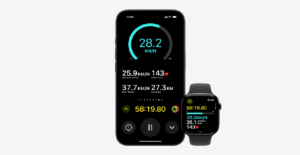Apple Watch Saves Hunter’s Life by Detecting Hidden Heart Condition
Tom Curran, a Colorado outdoorsman, initially mistook his sudden heart rate spikes for anxiety. After receiving an Apple Watch, he discovered he had atrial fibrillation (AFib) when the device alerted him to an irregular heartbeat. Doctors confirmed the diagnosis, and despite medication, his condition persisted. He eventually underwent a successful ablation procedure, eliminating AFib episodes for over a year and a half. Curran credits the Apple Watch for early detection and ongoing monitoring. Dr. Nicholas Palmeri emphasized that wearable technology helps detect AFib but should be medically verified. Curran encourages others to use smartwatches for heart health awareness and early intervention.

Apple Watch Saves Hunter’s Life by Detecting Hidden Heart Condition
A Colorado outdoorsman, Tom Curran, initially mistook his sudden heart rate spikes—sometimes exceeding 160 bpm while at rest—for anxiety. However, after receiving an Apple Watch as a gift, he discovered that he was experiencing atrial fibrillation (AFib).
Excited to test the watch’s heart monitoring features, Curran took it on a hunting trip without issue. But while relaxing at home afterward, his heart rate surged, and the watch alerted him to AFib. Recognizing the seriousness of the notification, he immediately sought medical attention.
Doctors at the hospital confirmed his AFib diagnosis and prescribed medication. Given his family’s history of strokes linked to AFib, Curran realized how serious his condition was. Dr. Nicholas Palmeri, a cardiac electrophysiologist at South Denver Cardiology and AdventHealth Porter, explained that AFib disrupts normal heart rhythms, increasing the risk of stroke due to potential blood clots.
Curran relied on the Apple Watch not only for initial detection but also for ongoing monitoring, helping guide decisions about his treatment. When medications proved ineffective, he underwent an ablation procedure, which successfully stopped his AFib episodes. Over a year and a half later, he remains symptom-free.
Dr. Palmeri highlighted that wearable technology like the Apple Watch has helped many people detect irregular heart rhythms, often leading to early AFib diagnoses. However, he emphasized the importance of medical confirmation, as self-diagnosis could lead to unnecessary worry or improper treatment.
Curran’s case reflects a growing trend, with thousands contributing AFib data to national studies aimed at improving treatment and reducing reliance on blood thinners. He encourages others to use wearable technology for monitoring heart health, calling it a small but valuable investment in early detection and peace of mind.
A Timely Diagnosis
Doctors at the hospital confirmed his AFib diagnosis and prescribed medication to help regulate his heart rhythm. Given his family’s history of strokes linked to AFib, Curran realized the potential danger he had been unknowingly living with. If left untreated, AFib can lead to serious complications, including heart failure and stroke, due to the formation of blood clots when the heart beats irregularly.
Dr. Nicholas Palmeri, a cardiac electrophysiologist at South Denver Cardiology and AdventHealth Porter, explained that AFib disrupts the heart’s normal rhythm, causing the upper chambers to quiver rather than contract properly. This irregularity can result in inefficient blood flow and increase the risk of clot formation.
The Role of Wearable Technology
Curran relied on the Apple Watch not only for initial detection but also for ongoing monitoring, helping guide decisions about his treatment. “Not only did it diagnose my AFib, but it also allowed me to track when episodes occurred and how long they lasted,” he said. The ability to monitor his condition in real time gave him greater control over his health.
However, despite taking prescribed medications, Curran continued experiencing AFib episodes. After extensive discussions with his medical team, he opted for an ablation procedure, a minimally invasive treatment designed to correct irregular heart rhythms by targeting and neutralizing problematic heart tissue. The procedure was a success, and over a year and a half later, Curran remains symptom-free.
Wearables and the Future of Heart Health
Dr. Palmeri highlighted that wearable technology like the Apple Watch has helped many people detect irregular heart rhythms, often leading to early AFib diagnoses. While devices like smartwatches are not a substitute for professional medical evaluation, they provide valuable insights that can lead to timely intervention.
Curran’s experience is part of a broader trend, with thousands contributing AFib data to national studies aimed at refining treatment options and reducing reliance on blood thinners, which can pose risks of excessive bleeding. “It’s reassuring to know that I have a way to track my heart’s activity,” Curran said.
Encouraging others to take their heart health seriously, Curran advises anyone experiencing irregular heart activity to seek medical attention and consider using wearable technology. “A smartwatch is a small price to pay for reassurance and early detection of something potentially life-threatening,” he said.
With wearable health technology advancing rapidly, both Curran and Dr. Palmeri hope to see even better, more personalized tools for managing AFib and other heart conditions. As technology continues to improve, devices like the Apple Watch may play an even greater role in preventing life-threatening complications and improving patient outcomes.
Check out TimesWordle.com for all the latest news
You must be logged in to post a comment.